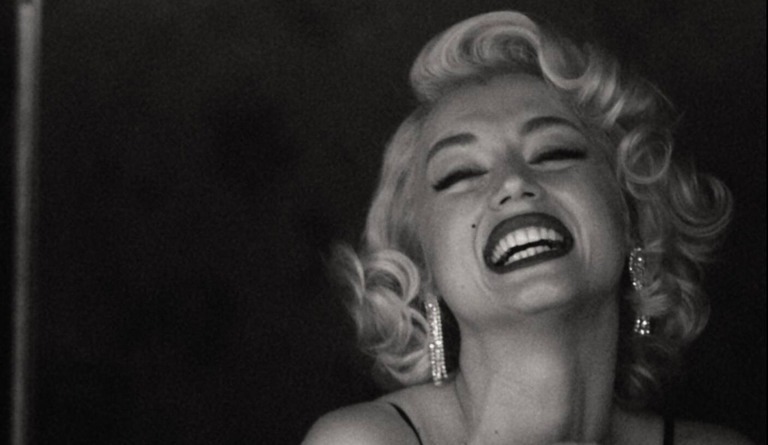Blonde Review: A Dark Look at a Shining Superstar!
After being delayed since July 2021, Blonde on Netflix is a highly awaited movie in the film community for its focus on one of the most famous women in recent memory. Ana de Armas, the Cuban-Spanish actor, embodies the iconic Hollywood superstar Marilyn Monroe in a film based on the 2000 novel by Joyce Carol Oates. The supporting cast also includes Adrien Brody, Bobby Cannavale, Xavier Samuel, and Julianne Nicholson in significant roles.
Related: Don’t Worry Darling Review – Pugh’s Nightmare Becomes the Audiences’
Blonde seems to have been negatively received by the majority of the film fraternity and audiences alike. But, this critic (I) seem to be in the minority as one of the few who felt this movie is getting misunderstood for its take on Monroe’s life and the direction Andrew Dominik took to tell her story. I feel a lot of criticism of the film is how several audience members thought it was handled when in reality, I seemed to have contradicting opinions on how I viewed the narrative.
When dealing with such a cultural icon and sex symbol in Marilyn Monroe, Dominik took a gamble in that he decided to adapt a book that is a work of fiction. However, given it focuses on a very real person, the movie can be misconstrued as a biopic, which it certainly is not. The base events that occur in the film may be factual, such as the marriages Monroe found herself in, the unfortunate miscarriages and abortions she had, and some other historical events which took place.
New poster of Andrew Dominik’s #Blonde, starring Ana de Armas. pic.twitter.com/HW2tgNSsvr
— Rotten Tomatoes (@RottenTomatoes) July 28, 2022
However, Blonde is a character study, not a biopic attempting to duplicate the experiences of Monroe, as her experiences in the film are mental and emotional struggles that only she could possibly understand. As a result, I watched it from the perspective of Norma Jeane as a character in a movie with little connection to Monroe as a real woman. I feel in that sense I found a lot more merit to the film than those who might have a deep connection to her as an actress or those who are fans of her work.
Taking it as such may leave you disappointed by the “legacy” this Netflix Original leaves behind of a remarkable woman. However, watching it as a fictionalized and layered narrative of a superstar on the verge of a mental breakdown because of the abuse and crass sexualization she endured, I was highly affected by this film.
Dominik’s stylistic choices on how to mesh Norma’s experiences with his style of filmmaking worked decently for me. Blonde goes from a clear-cut structure with easy-to-follow memories of Norma as a child to her frantic and distorted realities the further her mental health begins to collapse. I am a fan anytime the direction of a movie matches underlying themes or plot devices, so I felt this was handled beautifully. Although, there were some drawbacks that I was not a fan of. Including Norma’s unborn babies, speaking to her in her mind, as well as her father issues manifesting itself into a dialogue where she kept calling her husband “daddy” (in a non-sexual way, of course), a majority of the film worked for me.
One of the most discussed gripes audiences and critics seemed to have with Blonde was it was viewed to be highly exploitative, disrespectful, and a sort of “male gaze fest” in the way Ana de Armas was shot. Simply put, I never saw it this way and didn’t feel Dominik meant to create a male gaze of a female icon. I did not see any of the nudity as sexualizing Norma. Just because the female body is shown in such a way doesn’t mean it is for sexual purposes. Nothing about the scenes displaying nudity felt sexy at all, regardless of Marilyn’s character in the film being considered a sex symbol.
📸 New photo of Ana de Armas as Marilyn Monroe on the set of #Blonde. #AnadeArmas pic.twitter.com/N41QmYzO6W
— Ana de Armas Access (@dearmasaccess) September 20, 2022
Dominik was never gratuitous in his depiction of assault as it was all constructed through editing as opposed to the actors actually shooting scenes of sexual assault visually on screen. All in all, I can see how people viewing it as such will have a problem with Blonde, but I just did not see the film as exploitative. I felt deeply saddened by the intense trauma Norma suffered at the hands of others and saw the film as a deep study of a broken woman with little support in a ruthless industry. I felt Ana de Armas was fantastic in the portrayal of her character.
Blonde is definitely not for everyone, but if you look at it from a strictly fictionalized depiction of Norma Jeane Mortenson as a character and not as the real icon Ana de Armas portrays, there is a lot to get out of the film. That being said, this movie should be viewed with discretion for its NC-17 rating and should be watched with an open and mature mind (as opposed to those in my theater laughing constantly at traumatic moments for Norma because they didn’t like feeling uncomfortable, I guess). Blonde streams on Netflix beginning September 28th.
‘Blonde’ Rating – 3.5/5
Follow Steph (the Author) on Socials
Instagram – @cinemasteph_7
Twitter – @Stephanie23_23
- Hurry Up Tomorrow Review: An Off-Key Nightmare! - May 20, 2025
- Sinners Review: A Cinematic Spectacle! - April 23, 2025
- The Ugly Stepsister Review: A Fairy Tale in the Twilight Zone! - April 16, 2025





Pingback:Me Time & Meet Cute (2022) - Reviews | Just for Movie Freaks
Pingback:Smile (2022) Review: Contagiously Terrifying! [India] - Just for Movie Freaks
Pingback:Barbarian Review: An ESSENTIAL Horror Film! - Just for Movie Freaks